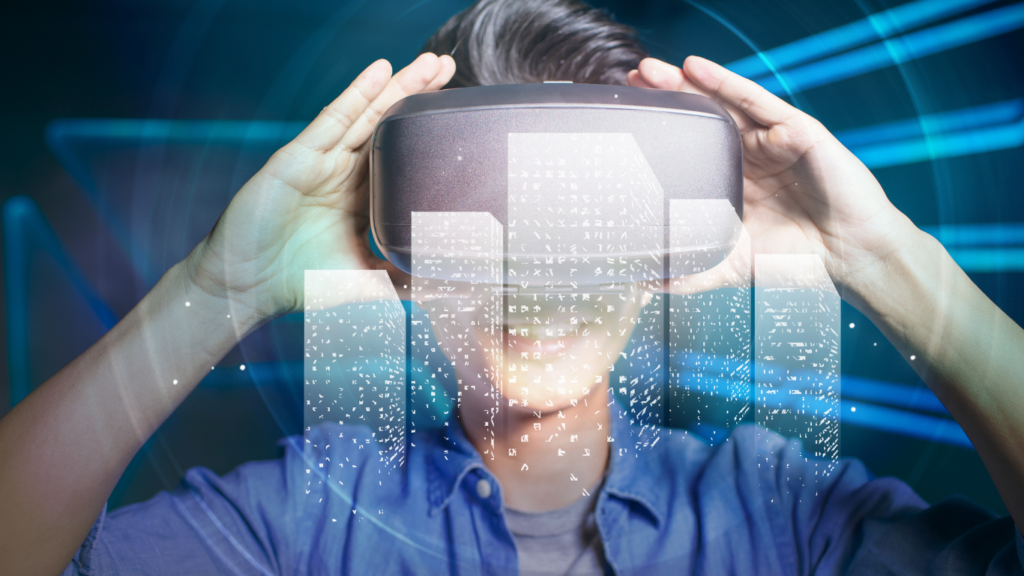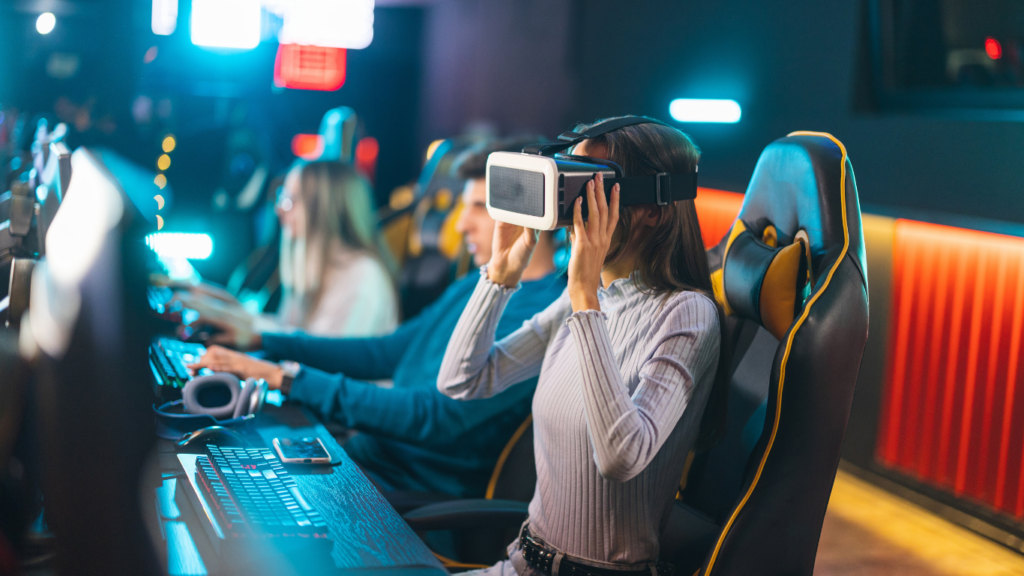What Are Virtual Reality Casinos?
Virtual reality casinos are online gambling platforms that use VR technology to create immersive and interactive environments. Players use VR headsets like Oculus Quest 2 or HTC Vive to access these virtual spaces, replicating the look and feel of traditional casinos.
In these casinos, users can interact with other players and dealers via avatars, enhancing social engagement. Features include walking through detailed casino floors, sitting at poker tables, or spinning roulette wheels—all in a 3D setting.
These platforms offer traditional games like:
- blackjack
- slots
- poker
often with customizable surroundings to suit individual preferences. Many VR casinos incorporate unique elements such as leaderboards, live tournaments, and themed environments to stand out from standard online gambling sites.
The Technology Behind Virtual Reality Casinos
VR technology combines advanced hardware and software to create immersive gambling environments. By simulating real-world casino settings, it enhances user engagement and transforms online gaming into a lifelike experience.
How VR Works in Gambling
- VR in gambling utilizes 3D mapping, high-resolution graphics, and motion tracking to replicate the physical elements of a casino.
- Developers program interactive environments where players navigate virtual spaces, interact with objects, and engage with others.
- Artificial intelligence often powers non-player characters like dealers, ensuring realistic interactions.
- Real-time data processing synchronizes in-game actions for seamless gameplay, whether placing bets or spinning roulette wheels.
Required Equipment for a VR Casino Experience
Accessing a VR casino experience requires a VR headset, motion controllers, and compatible software. Popular devices include Meta Quest 2 and HTC Vive, which provide high-resolution visuals and spatial audio. Controllers translate hand gestures into virtual actions, such as handling chips or cards. Some systems use room sensors to enable 360-degree movement, while others rely on built-in tracking. A stable internet connection ensures smooth interaction with online gaming platforms.
Benefits of Virtual Reality Casinos

Virtual reality casinos offer unique advantages that set them apart from traditional online gambling platforms and physical casinos. These benefits enhance players’ overall gaming experiences while breaking technological boundaries.
Enhanced Immersion and Realism
Virtual reality casinos provide an immersive and realistic gaming environment. High-resolution graphics, 3D soundscapes, and detailed designs simulate traditional casino settings, making players feel physically present in virtual spaces. Motion tracking lets players interact with objects, like spinning roulette wheels or handling poker chips, enhancing engagement. Advanced technologies ensure a seamless fusion of digital and physical worlds, creating lifelike experiences.
Social Interaction and Multiplayer Features
VR casinos facilitate rich social interactions. Players can communicate with others through custom avatars, emulating face-to-face interactions. In multiplayer games, like poker or baccarat, users engage in real-time conversations via voice chat, fostering a sense of camaraderie. Social features, such as leaderboards, live tournaments, and private gaming rooms, encourage collaboration and competition, enhancing community involvement.
Convenience and Accessibility
VR casinos redefine accessibility by eliminating the need for travel. Users access these platforms from home with VR headsets and stable internet connections. The platforms operate 24/7, providing flexibility for users in different time zones. Additionally, customizable environments enable players to modify the ambiance, ensuring tailored experiences without physical barriers or added expenses like lodging or transport.
Challenges Facing Virtual Reality Casinos
Virtual reality casinos bring innovation to gambling but face notable obstacles. These challenges could influence their ability to achieve mainstream success.
High Entry Costs for Users
Accessing VR casinos requires expensive equipment. VR headsets, like the Oculus Quest 2 or HTC Vive, cost between $300 and $1,000. In addition, users may need gaming PCs priced at $1,000 or more for optimal performance. These costs make the technology less accessible to casual gamblers, limiting widespread adoption.
Potential Risks of Addiction
The immersive nature of VR casinos heightens engagement but increases the risk of compulsive gambling. Features like lifelike interactivity and 24/7 accessibility can lead to excessive usage. A study from the National Center for Responsible Gaming highlights how immersive technologies enhance addiction risks, demanding stricter safeguards like self-exclusion tools and spending monitors.
Limited Game Variety and Technical Issues
VR casino libraries currently lack diversity. Many platforms focus on classics like poker, blackjack, and slots, leaving fans of niche games unfulfilled. Additionally, technical challenges like motion sickness, latency, and connectivity issues disrupt gameplay. Reports from users on forums often mention hardware malfunctions or software glitches, emphasizing how these problems hurt user experience and retention.



 Veronique Godinezie – Entertainment & Gambling Trends Writer
Veronique Godinezie is an expert in the ever-evolving relationship between gambling and entertainment, serving as a Gambling Trends Writer at Gamble Wise Roll. With a keen interest in how gaming intersects with pop culture, esports, and digital innovation, she explores the latest trends that are redefining the gambling experience. From interactive betting experiences and skill-based gambling to the rise of virtual casinos and celebrity-endorsed gaming platforms, Veronique provides engaging and forward-thinking content that keeps readers informed about the future of gambling. Her storytelling brings an exciting and dynamic perspective to Gamble Wise Roll, offering insights into how the industry continues to evolve in the digital age.
Veronique Godinezie – Entertainment & Gambling Trends Writer
Veronique Godinezie is an expert in the ever-evolving relationship between gambling and entertainment, serving as a Gambling Trends Writer at Gamble Wise Roll. With a keen interest in how gaming intersects with pop culture, esports, and digital innovation, she explores the latest trends that are redefining the gambling experience. From interactive betting experiences and skill-based gambling to the rise of virtual casinos and celebrity-endorsed gaming platforms, Veronique provides engaging and forward-thinking content that keeps readers informed about the future of gambling. Her storytelling brings an exciting and dynamic perspective to Gamble Wise Roll, offering insights into how the industry continues to evolve in the digital age.
